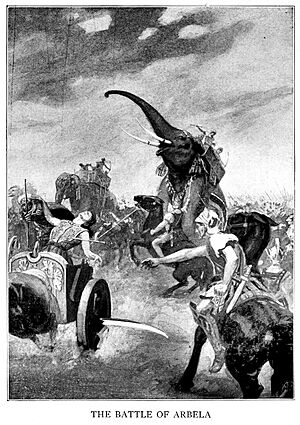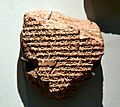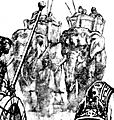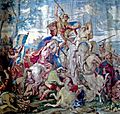Battle of Gaugamela facts for kids
The Battle of Gaugamela (also known as The Battle of Arbela) was a huge and important battle. It was fought between Alexander the Great and the powerful Persian Empire. This famous battle happened in 331 BC. It was a key moment in history, deciding who would control a vast part of the world.
Contents
What Was the Battle of Gaugamela?
The Battle of Gaugamela was a major clash between two of the greatest military leaders of their time. On one side was Alexander the Great, leading the Greek and Macedonian armies. On the other side was King Darius III, the ruler of the vast Persian Empire. The battle took place near a small village called Gaugamela, which is in modern-day Iraq.
Why Was This Battle Important?
This battle was incredibly important because it decided the fate of the Persian Empire. Alexander had been fighting Darius for several years. He had already won some big victories. Gaugamela was the final showdown. A win for Alexander meant the end of the Persian Empire. A win for Darius would have stopped Alexander's conquests.
Who Were the Main Leaders?
- Alexander the Great: He was the young and brilliant king of Macedon. Alexander was known for his clever battle plans and his bravery. He led his soldiers from the front.
- Darius III: He was the last king of the Achaemenid Persian Empire. Darius commanded a much larger army than Alexander. He hoped to use his numbers to crush Alexander's forces.
Where Did the Battle Happen?
The battle took place on a wide, flat plain. This area was near the modern city of Erbil in Iraq. Darius chose this location carefully. He wanted to use his large army and his chariots effectively. He even had the ground leveled to make it easier for his chariots to attack.
When Did the Battle Take Place?
The Battle of Gaugamela was fought on October 1, 331 BC. It was a long and intense day of fighting. The battle started in the early morning and lasted for many hours.
How Did the Armies Prepare?
Both sides prepared for the battle very carefully. Alexander's army was smaller but very well-trained. They used a formation called the phalanx. This was a tight group of soldiers with long spears. Darius had a much larger army. It included soldiers from all over his empire. He also had special units like war elephants and scythed chariots. These chariots had blades on their wheels.
Alexander's Clever Plan
Alexander knew he was outnumbered. So, he came up with a very smart plan. He decided to attack the Persian army's flanks (sides). He also planned to create a gap in the middle of Darius's lines. This would allow him to strike directly at Darius.
Darius's Battle Formation
Darius placed his best soldiers in the center. He hoped to break Alexander's lines with his chariots and cavalry. He also had a large number of infantry (foot soldiers).
The Battle Begins
The battle started with Alexander's army moving forward. Alexander led his right wing (right side) at an angle. This made Darius think Alexander was trying to go around his army. Darius then sent his scythed chariots to attack.
The Chariot Attack
The Persian chariots charged towards Alexander's lines. However, Alexander's soldiers were ready. They opened their ranks, letting the chariots pass through. Then, they attacked the chariots from the sides and rear. Many chariots were stopped or destroyed.
Alexander's Decisive Move
While the chariots were being dealt with, Alexander made his main move. He saw a gap open up in the Persian center. This happened because Darius had moved some of his cavalry to counter Alexander's flank movement. Alexander quickly led his elite cavalry, called the Companions, straight into this gap.
The End of the Battle
Alexander and his Companions charged directly towards Darius. Seeing Alexander coming, Darius became afraid. He turned his chariot and fled the battlefield. When the Persian soldiers saw their king running away, their morale broke. They began to flee too.
Alexander's Victory
Alexander had won a huge victory. The Persian army was scattered. Alexander then turned to help his left wing, which was still fighting hard. By the end of the day, the Persian Empire's power was broken.
What Happened After Gaugamela?
After the battle, Alexander continued his conquest. He captured important Persian cities like Babylon and Susa. Darius III eventually fled further east but was later killed by his own relatives. Alexander then became the ruler of the vast Persian Empire. The Battle of Gaugamela was a turning point in ancient history. It marked the end of the Persian Empire and the rise of Alexander's Hellenistic (Greek-influenced) world.
Images for kids
-
Account of Alexander's victory over the last Achaemenid king Darius III at the battle of Gaugamela on 1 October 331 BCE and his triumphant entry into Babylon, in cuneiform. Babylon, Iraq. British Museum
-
A decorative Neo-Attic relief of the Battle of Gaugamela, with allegories of Europe and Asia standing on the side, 2nd century BC-2nd century AD. Rome, Palazzo Chigi. 19th century reproduction by engraving.
-
The Battle of Gaugamela is illustrated in this tapestry, based on a painting by the 17th-century French artist, Charles Le Brun (1619-90). Le Brun undertook a series of paintings in the 1660s and 1670s depicting the triumphs of Alexander the Great, as homage to his wealthy patron, King Louis XIV.
-
Alexander entering Babylon.
See also
 In Spanish: Batalla de Gaugamela para niños
In Spanish: Batalla de Gaugamela para niños
 | Kyle Baker |
 | Joseph Yoakum |
 | Laura Wheeler Waring |
 | Henry Ossawa Tanner |










